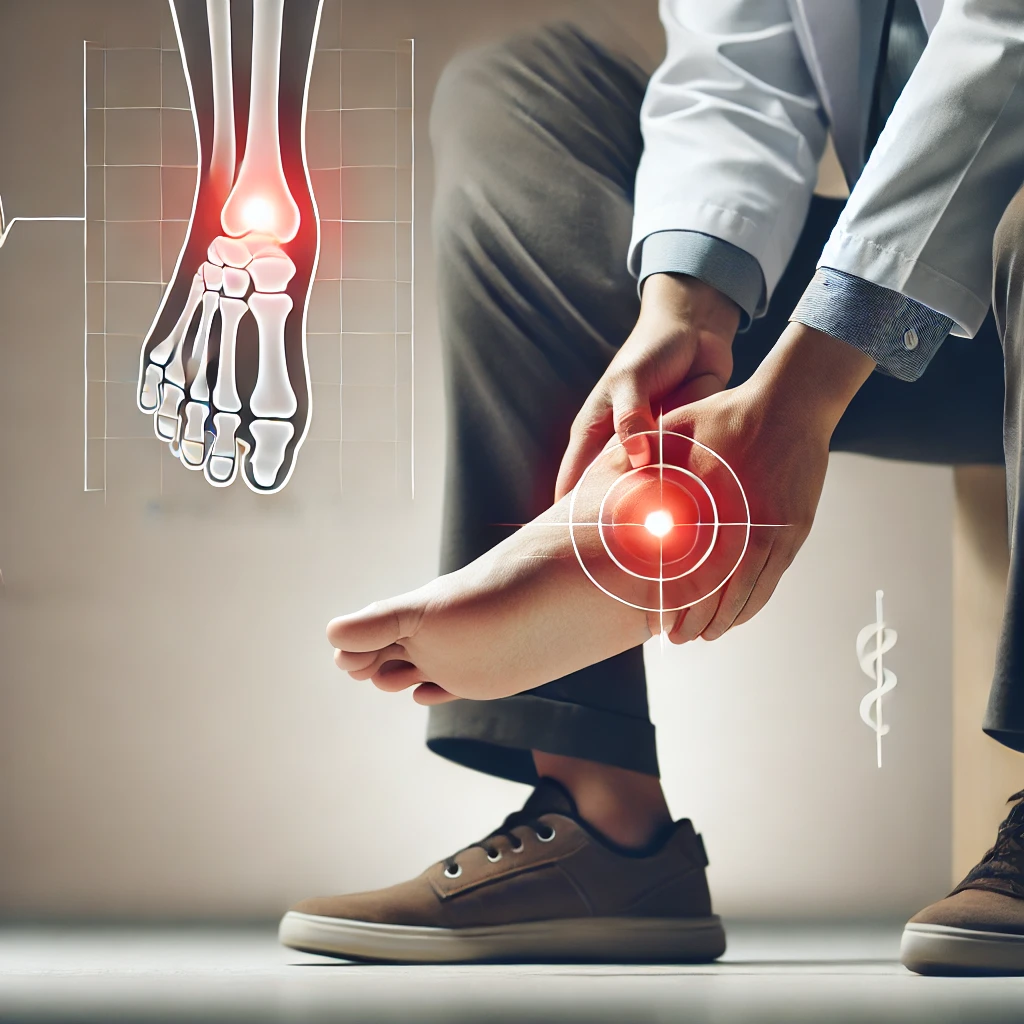Blog
Is Heel Pain a Sign of Cancer? Understanding Causes, Symptoms, and When to Seek Help

Heel pain can be a frustrating and concerning issue, especially if it lingers or worsens over time. Many people worry about whether heel pain could be a sign of something more serious, like cancer. While most cases of heel pain are not related to cancer, it’s natural to wonder if this symptom could be pointing to a bigger health problem. In this blog, we’ll explore the possible causes of heel pain, discuss whether it could be a sign of cancer, and offer guidance on when to seek medical advice.
Common Causes of Heel Pain
Heel pain is a common issue that affects people of all ages. In most cases, it is caused by conditions that are not related to cancer. Here are some of the most common causes of heel pain:
1. Plantar Fasciitis
Plantar fasciitis is the most common cause of heel pain. It occurs when the plantar fascia—a thick band of tissue that runs along the bottom of your foot—becomes inflamed. This condition is usually characterized by sharp pain in the heel, especially when taking your first steps in the morning or after long periods of rest.
2. Heel Spurs
Heel spurs are bony growths that form on the bottom of the heel bone. They are often associated with plantar fasciitis and can cause pain when pressure is placed on the heel. Heel spurs are more likely to occur in individuals who have flat feet or high arches.
3. Achilles Tendinitis
Achilles tendinitis is a condition that occurs when the Achilles tendon becomes inflamed, often due to overuse or repetitive stress. This can lead to pain at the back of the heel, particularly after physical activity.
4. Bursitis
Bursitis is the inflammation of the bursae—small, fluid-filled sacs that help cushion the bones, tendons, and muscles near your joints. Heel bursitis can cause pain in the heel area, especially when walking or standing.
5. Stress Fractures
Stress fractures are small cracks in the bones that can result from repetitive impact, such as running or jumping. Stress fractures in the heel bone can cause pain, especially during physical activities.
Can Heel Pain Be a Sign of Cancer?
While heel pain is rarely a sign of cancer, it is possible in some rare cases. Cancer can sometimes cause pain in the bones, including the heel, but this is not a common cause of heel pain. Here are a few situations in which heel pain might be related to cancer:
1. Bone Cancer (Osteosarcoma)
Osteosarcoma is a type of bone cancer that can affect any bone in the body, including the heel bone (calcaneus). This type of cancer typically affects children and young adults, and it often presents as bone pain that may worsen over time. The pain is usually persistent and may be accompanied by swelling or a noticeable lump near the affected bone.
2. Metastatic Cancer
Sometimes, cancer from another part of the body can spread (metastasize) to the bones. When this happens, the heel bone could potentially be affected, leading to heel pain. This is more likely in individuals who have a history of cancer, especially cancers that commonly spread to the bones, such as breast, lung, or prostate cancer.
3. Soft Tissue Sarcoma
Soft tissue sarcomas are rare cancers that can develop in the tissues that connect, support, or surround other structures in the body, including muscles and tendons. If a soft tissue sarcoma develops in the foot or heel area, it may cause pain, swelling, or a noticeable mass.
4. Leukemia
Leukemia is a type of cancer that affects the blood and bone marrow. One of the symptoms of leukemia can be bone pain, which may occasionally be felt in the heels or other parts of the body. This type of pain is usually more generalized and not limited to just one area.
Signs That Heel Pain Could Be More Serious
Most heel pain is not caused by cancer, but there are certain signs that may indicate a more serious condition. If you experience any of the following symptoms along with heel pain, it’s important to consult a healthcare professional:
- Persistent Pain: If your heel pain does not improve with rest, ice, or over-the-counter pain medications, it may be time to see a doctor.
- Swelling or Lumps: Swelling, lumps, or masses in the heel area that do not go away could be a sign of a more serious issue and should be evaluated by a healthcare provider.
- Pain at Night: Heel pain that worsens at night or disrupts your sleep could indicate a more serious underlying condition, including cancer.
- Unexplained Weight Loss: If you experience unexplained weight loss along with heel pain, it could be a sign of an underlying health issue, including cancer.
- Fever or Fatigue: If your heel pain is accompanied by a persistent fever or fatigue, it could indicate a systemic problem that requires medical attention.
When to See a Doctor for Heel Pain
If your heel pain is severe, persistent, or accompanied by other concerning symptoms, it is important to see a doctor for a thorough evaluation. A healthcare professional can help determine the cause of your heel pain and recommend appropriate treatment options. Here are some situations in which you should seek medical attention:
- Sudden Onset of Severe Pain: If you experience a sudden onset of severe heel pain, it could be due to a fracture or other serious condition that requires immediate medical attention.
- Difficulty Walking: If your heel pain is making it difficult to walk or perform daily activities, it’s important to get evaluated by a doctor.
- No Improvement with Home Treatment: If your heel pain does not improve with rest, ice, or over-the-counter medications, it’s time to see a healthcare provider for further evaluation.
Diagnosis and Treatment of Heel Pain
To determine the cause of your heel pain, your healthcare provider may perform a physical examination, review your medical history, and order imaging tests, such as X-rays or MRI scans. These tests can help identify any abnormalities in the bone or soft tissues that could be causing your pain.
Treatment Options for Heel Pain
The treatment for heel pain will depend on the underlying cause. Here are some common treatment options:
- Rest and Ice: Resting the foot and applying ice can help reduce inflammation and pain.
- Pain Medications: Over-the-counter pain relievers, such as ibuprofen or acetaminophen, can help alleviate pain and reduce inflammation.
- Physical Therapy: Stretching and strengthening exercises can help relieve pain caused by conditions like plantar fasciitis or Achilles tendinitis.
- Orthotic Devices: Shoe inserts or orthotic devices can help provide support and reduce stress on the heel.
- Surgery: In rare cases, surgery may be required to address the underlying cause of heel pain, such as removing a heel spur or treating a tumor.
Preventing Heel Pain
While not all cases of heel pain can be prevented, there are some steps you can take to reduce your risk:
- Wear Supportive Shoes: Choose shoes with good arch support and cushioning to reduce stress on your heels.
- Stretch Regularly: Stretching your calf muscles, Achilles tendon, and plantar fascia can help reduce the risk of developing heel pain.
- Maintain a Healthy Weight: Excess weight can put added stress on your heels, so maintaining a healthy weight can help reduce your risk of heel pain.
- Avoid Overuse: Avoid repetitive activities that put excessive stress on your heels, and take breaks when needed.
Conclusion: Is Heel Pain a Sign of Cancer?
In most cases, heel pain is not a sign of cancer. Common causes of heel pain include plantar fasciitis, heel spurs, Achilles tendinitis, bursitis, and stress fractures. While cancer can cause heel pain in rare cases, it is not a common cause. If you are concerned about your heel pain or if it is accompanied by other concerning symptoms, it is important to see a healthcare professional for a thorough evaluation.
By understanding the potential causes of heel pain and knowing when to seek medical help, you can take the necessary steps to address the issue and get back to your normal activities. Remember, early diagnosis and treatment are key to managing any health condition effectively.
